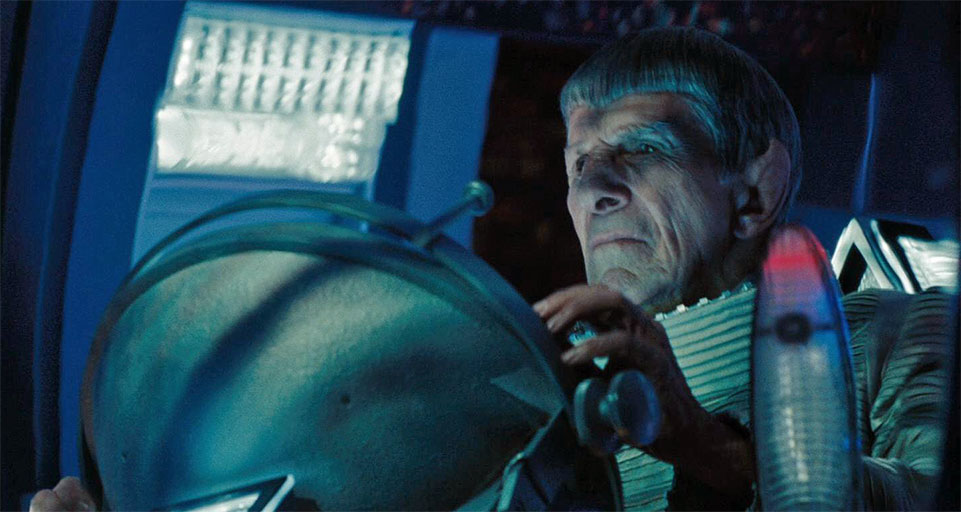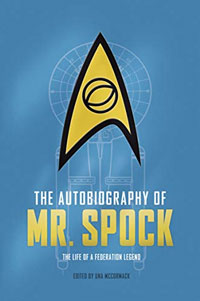Titan Books’ line of autobiographies for major Star Trek characters gets its fourth entry with The Autobiography of Mr. Spock by Una McCormack, which follows on the previous entries in the series on James T. Kirk, Jean-Luc Picard, and Kathryn Janeway.
If you’re anything of a Spock fan, you’re going to really enjoy this book, which capably weaves together this seminal character’s history and appearances throughout the Star Trek franchise in a thoroughly authentic way.
This book was delayed nearly three years from its original 2018 publication date — and even changed authors along the way. Originally, this was to be the third book in the series and authored by David A. Goodman, who had written the previous Kirk and Picard books.
But likely due to the decision by Star Trek: Discovery to include the character in its Season 2 storyline — there played by Ethan Peck — the book was pushed back for revisions, and Una McCormack stepped in to take over the project.
Thankfully, the book has benefited from the two years’ delay; given how important much of the character’s arc in Discovery was to his life, not to have included that would have made the book totally incompatible with the canon as developed.
As it stands, the book covers everything about the character’s life, from his early childhood, his shared youth with Michael Burnham, his long tenure on the Enterprise, his diplomatic work, and his turn towards trying to achieve reunification between the Romulans and the Vulcans later in life.

The conceit of the book is that it is part of the Vulcan tradition of a t’san a’lat, a “wisdom book,” which is written by a Vulcan who believes they may be at the end of their life.
The t’san a’lat allows them to look back and reflect. Spock’s t’san a’lat is written shortly before his journey to try and stop the Romulan supernova from destroying Romulus, as depicted in the first Kelvin Timeline Star Trek film — and perhaps most intriguingly, the book is written directly for Admiral Jean-Luc Picard (retired).
Unlike the other autobiographies, which are structured in sequential order of events in the person’s life, the Spock autobiography instead structures itself around the character’s relationship with others. These follow an almost chronological order of individuals who were important to the character at different times, including Michael Burnham, Christopher Pike, Leonard McCoy, Sarek, and Pardek (from “Unification”), and others.
The structure allows for Spock to deeply examine his relationship with each of them — and there are a couple of surprises in there — and reflect on his life.
And in another departure from the other autobiographies, there aren’t too many twisty revelations in here of things that happened in the character’s life that is not entirely rooted in canon. David A. Goodman’s Kirk and Picard books had some very creative angles on parts of the Star Trek canon, and even Una McCormack’s Janeway autobiography has a final twist that comes out of left field.

The Autobiography of Mr. Spock, on the other hand, plays it straight, largely because we know so much about the character’s life from the moment of birth all the way up through his death. It adheres very closely to canon, and even snuck in the full name of Number One from Strange New Worlds… revealed as “Una Chin-Reilly” back on Star Trek Day.
Rather than providing us with surprising twists and turns in the character’s backstory, instead McCormack decides to go deep into the character’s psyche, providing a lot of room for Spock to consider his role in events and his relationships with others. For such an introspective look at the character, it was essential that McCormack be able to capably thread together both the Leonard Nimoy and Ethan Peck versions of Spock, and to write so authentically as Spock that you can hear Leonard Nimoy’s voice strongly in your mind as you go.
I am pleased to report the book accomplishes this task and is probably the most successful book in some time in entirely capturing Spock’s voice and essence. You really do feel like you are getting to know the character better, and not just some pale imitation.

To that end, the character’s new backstory from Discovery seamlessly integrates into the story of his life and does not feel forced.
McCormack even comes up with an explanation for why his half-brother Sybok — who also gets his own chapter — is not seen in the Discovery flashbacks to young Spock and Burnham’s childhood. The role of Michael Burnham in Spock’s life is an important one because of Discovery, and that relationship is given room to breathe in the book. When you see the whole tapestry of Spock’s life, as written here, Michael Burnham fits comfortably within it.
There is one creative choices in the book, however, that is likely to be controversial: McCormack chooses to make this book be more about the relationship between Spock and Picard — due to the late 24th century nature of when it was ‘written’ — rather than Spock’s relationship with James Kirk.
Kirk is a constant presence throughout the book, with the exception of a short chapter at the end, but he does not really become one of the subjects that Spock considers. I think some people are going to be disappointed by that, though it seems to me that given how much fan debate there is over the Kirk/Spock relationship (including the potential for more), and how much has been written about it by other authors, perhaps that’s less interesting ground to cover and is likely to disappoint people in some way, no matter how it’s presented.

Overall, The Autobiography of Mr. Spock is another triumphant book for Una McCormack, who is absolutely the go-to author for introspective character work. That’s her true writing strength, and it shines through here as she tells a reflective story in the voice of Leonard Nimoy of Spock’s life and experiences as he senses he is nearing its end.
There is some sadness as a result, but both Spock and Leonard had full and rich lives, and that’s the spirit that book carries with it. It’s probably the most authentic character portrayal from these autobiographies to date.

